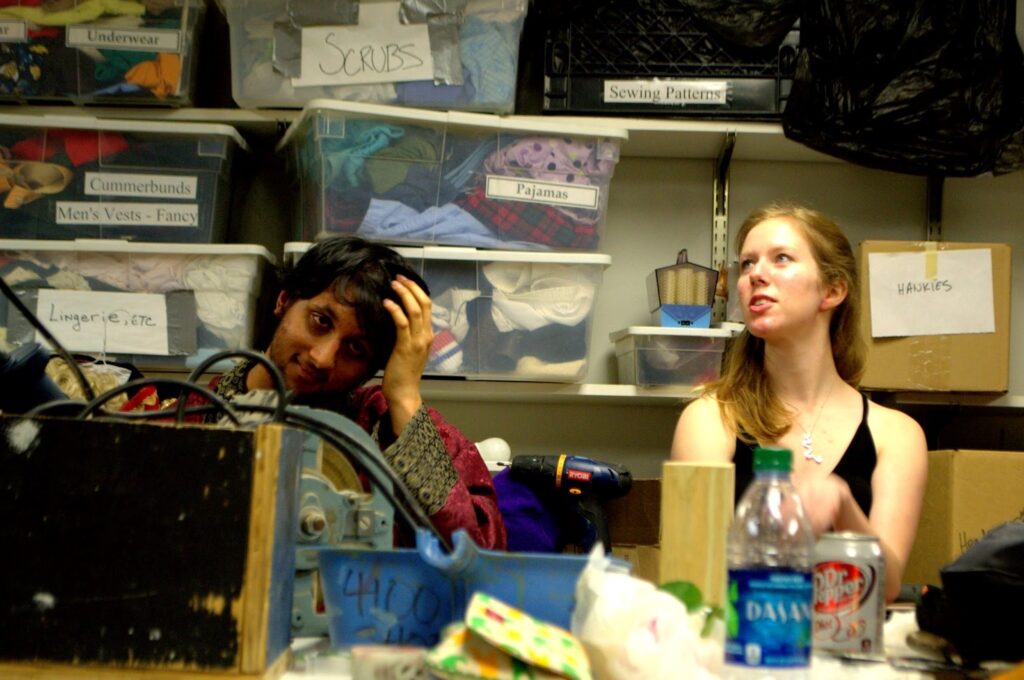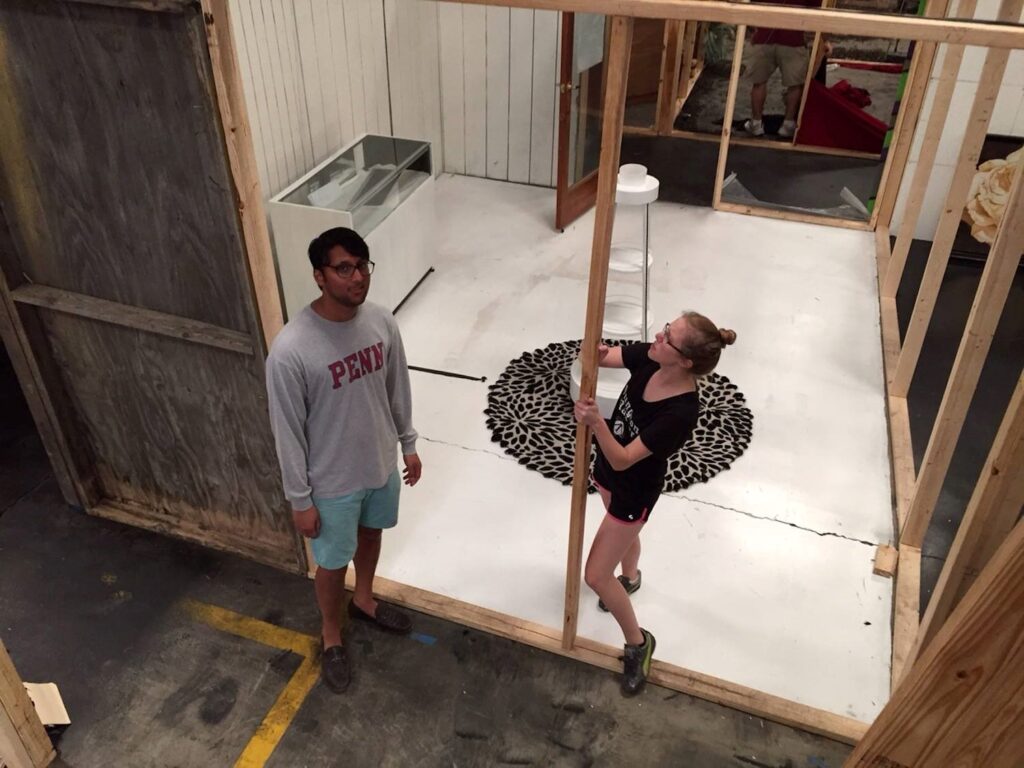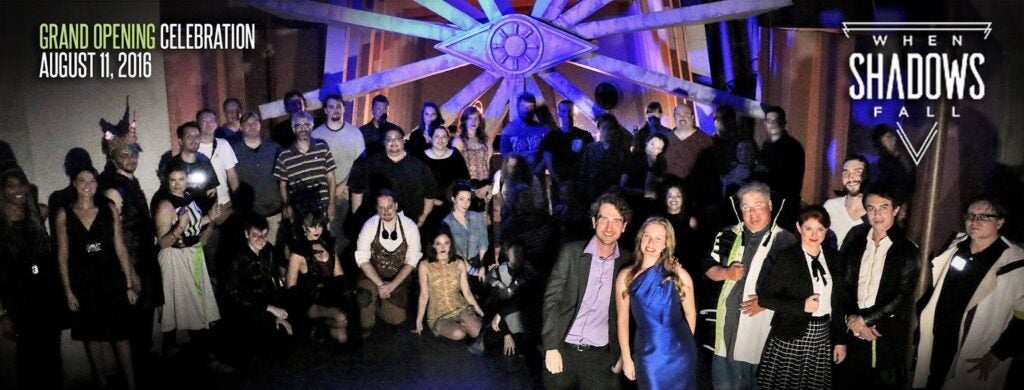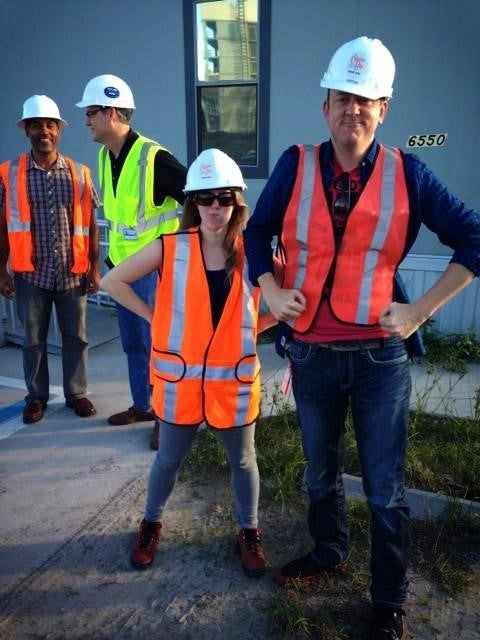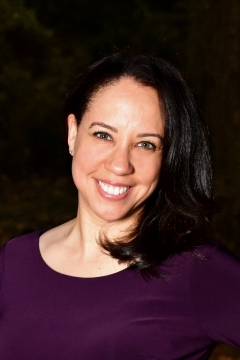Allison Powell, C’93
Sarah Elger, GAR’13
Kalyne Coleman, C’14
Daina Troy, W’98
Arnab Mishra, W’96
During his undergraduate experience at Penn, Arnab Mishra spent tons of time flexing his creative muscles in and out of the classroom. He shares that his college experience was a transformative one, especially due to Penn’s cross-disciplinary nature. Arnab majored in finance and used his elective credits to dabble in literature, writing, and music classes, even learning how to play the sitar (the latest in a long line of instruments he grew up playing). When not studying, Arnab worked at the student radio station and served as a columnist for the Wharton journal. He interned at multiple magazines in New York City and realized that his original plan to pursue journalism as a career was not the correct path for him. However, Penn offered him the chance to experiment with multiple career paths, all while forging lasting connections with peers from diverse backgrounds who helped him expand his ability to see the world. Arnab credits these friends with providing him new perspectives even to this day (even on pandemic Zoom calls).
In school, Arnab realized that his favorite pursuits combined the creative and the analytical. After graduating, he made his way back to New York, working in investment banking and private equity. The firm where he worked had raised a growth capital fund in the midst of the dot-com bubble, and he spent time investing in mid to late stage technology companies. Arnab discovered a love for technology entrepreneurship and building businesses from the ground up. After attending Harvard Business School, he relocated to San Francisco to work on his first of two startups. Both companies were eventually sold to larger public companies, the first to the French-based Alcatel and the second to east coast-based Broadsoft. Arnab still lives in the Bay Area with his wife, originally from Northern Virginia, and their two children. After two decades, he jokes that their family has finally stopped asking when they will move back east. Arnab currently serves as the Chief Product Office at Xactly, where over the last four years he has dramatically expanded the company’s product line, applying a knowledge of market opportunities and user needs. Arnab loves his job, as it once again allows him the room to be analytical and to creatively suss out solutions.
Arnab has also been a very active alum. In 2013, he joined the James Brister Society. Founded in the early 90s and named after the first African American to graduate from the University, the James Brister Society is the umbrella alumni organization for diversity and inclusion at Penn. Arnab has served as the Co-Chair of multiple committees in the Society, and what he loves most is helping advise the University on initiatives to create a more inclusive space for faculty, staff, and students. When asked to join the Platt House Alumni Advisory Council, Arnab was not sure if he was the best fit, since performing arts was not at the foreground of his college experience, nor his current work. However, Arnab says he was drawn to Platt House’s goal of increasing diversity and inclusion initiatives and Platt House’s ethos of uplifting voices. One of Arnab’s first roles on the Council was supporting a panel discussion on racial and social equity in the arts this past spring. The session was geared toward alumni with a goal of updating them on current trends and goals in the student performing arts spaces. Platt House is so excited that Arnab has joined this team, as we are grateful for his experience with advocacy work and his perspective from the business world. Many of our students have followed in his footsteps as students in the Wharton School, and we have a lot to gain from his insight.
When asked why the arts are important, Arnab shares: “I dont view art as a thing unto itself. I think the notion of art and the notion of creativity lives in every single discipline out there. It’s universal.” Arnab explains that even when creating software products, there is a level of artistry within them. Arnab also shares that he believes philosophically that “art is a place where the human spirit can be expressed like no other. I think having those outlets for people is really important. [People] can talk frankly about sensitive subjects through art. In the US, the more diverse and progressive and accepting we become as a country, the more we need the arts to create a space for those discussions.” Arnab believes that students can leverage their performing arts experience beyond college because every performance is a team effort. He says it is the team that works together to deliver a unified product, which is business in a nutshell. He continues, stating that the performing arts also demand a kind of rigor and help people learn to be comfortable addressing other people. “Studies show that leaders who are comfortable being vulnerable in front of others are the most effective in leading.” Arnab reminds us that the performing arts help shape new leaders, no matter what discipline they ultimately pursue.
This interview was conducted by Jadel Contreras, C’22.
Sara Outing, C’13
Sara Outing, C’13 is Platt House’s inimitable Administrative Coordinator! She came to Penn from Chapel Hill, NC and graduated with a degree in Theatre Arts. Since then, her journey has looped through the regional and Fringe theatre scenes of Philadelphia and its suburbs. In her time away from Platt House, she enjoys the gorgeous landscape and history of her neighborhood in the Northeast, practices a clutter of creative hobbies, and continues to freelance as a scenic designer, props fabricator, and puppeteer. As a student, Sara knew she wanted to try her hand at scenic design, so she engaged in design and carpentry gigs with 4A, Players, Singers, Quadramics, Stim, and the Theatre Arts Program. Additionally, Sara was a founding member of Keynotes A Cappella and was briefly a member of PLBD. These formative experiences sparked in her lasting loves for social dance, singing, and music composition.Through living in the Arts House residential program in Harnwell and participating in the performing arts scene on campus, Sara found a space not only for practiced talents, but also for new beginnings. Sara shares: “Despite the stereotype of performative excellence at Penn, within my creative community I felt the invitation to fly or fail at sight-reading a new tune on violin, to show up as a newbie at West Philly Swingers’ Fish Fry, to bumble through my first Noteflight arrrangement, to mix colors fearlessly in the PAC Shop.” During undergrad, Sara learned to enjoy and celebrate the experience of being an amateur just as much she celebrates honing her craft. This willingness has served her well in the freelance arts world. Sara reminisces over some Penn memories including watching friends and strangers shine onstage, specifically citing a Quadramics’ Fling Production of Andrew Lippa’s The Wild Party, which “blew [her] teenage mind.” Sara also fondly recalls her own “rare” moments onstage, stating that she is not truly confident as an actor but is so proud of her past self for giving it her all. [Platt House jumping in to say that Sara is a humble, but truly skilled performer, acting included!]Sara is also the creator of the brand-new Backstage @ Platt House podcast! Sara identifies as a “podcast person,” her interest stemming from Welcome to Night Vale a few years ago and recently landing on Alie Ward’s Ologies. Back in March, Sara was working with a bunch of local arts alumni for an in-person panel. Once Platt House programming moved to the virtual sphere, the podcast format seemed like an obvious and exciting transition. The first season of the podcast features those local arts alumni and a few University staff. Backstage @ Platt House Season 2 will have a student focus, acting as a conduit among performing arts community members.
This summer, Sara was one of six artists awarded with the Black Puppeteer Empowerment Grant from Puppet Showcase Theatre near Boston. As part of her remote Creative Residency, she developed a short original shadow show alongside the other artists. Sara is next looking forward to her upcoming design project for an Alice Childress piece with the Philadelphia Artists Collective. She recently delivered a set of creative props to one of her favorite companies, Bearded Ladies Cabaret, whose projects are always artistically entertaining, emotionally nourishing, and queer as can be. Sara will also be diving into a props/paper/packaging design on an afrofuturist story-by-mail with an incredible company, Tiny Dynamite, and an incredible new collaborator, local playwright Jarrett McCreary. Check out Sara’s website for more!
To those interested in pursuing the arts beyond college, Sara says “The arts industries can sometimes romanticize ‘imposter syndrome’ as a noble trait of humble and hardworking creatives. Don’t fall into the trap of internalizing a value system that hurts you! After many years, I’ve been incredibly fortunate to land among companies, organizations, and collaborators who empower my sense of artistic self and pay attention to my financial health, but that work has to occur within as it does without. If you find imposter syndrome and self-denial, sit with it. Take note of your worth, and hold tight to people around you who do the same.”
Photo Credits: Boaz Kim
Jennifer Weber, C’00
Get to know our featured alum, Jennifer Weber, C’00! Jennifer is a choreographer living in New York City. She graduated from Penn in 2000 with a major in Communications, but not before founding Strictly Funk Dance Company. Before Strictly Funk got off the ground, Jennifer was a choreographer and performing member of Bloomers. She says it was amazing, but singing is not her forte, so she wound up playing a mime and a bunch of frat boys. She auditioned for a handful of dance groups on campus, and was not selected, but she really began to miss dancing and decided to take matters into her own hands. Jennifer placed flyers all over campus and drummed up a ton of interest for a new dance group. Funk’s first audition had 20 people. When she came back for her sophomore year, Funk participated in Freshman Performing Arts Night (now rebranded as Student Performing Arts Night). After that showcase, 80 people auditioned for the group! Jennifer reflects fondly on the relationships that were built through that experience. She says that dancing is a “magical way to connect with people [I] wouldn’t have met otherwise.”
Creating Strictly Funk really launched Jennifer onto her future career path. She did not originally think she would be a professional choreographer. After graduating, she landed a job in marketing, but she found herself pulled toward a life in the arts. Jennifer says that seeing Funk succeed made it seem like it would be easy to create a company and succeed in New York. The reality of that goal was much more complicated, but her experiences with Funk absolutely prepared her to face any challenges head-on. And her success has only grown, demonstrated by the many exciting projects she is working on. She choreographed her first movie Z-O-M-B-I-E-S 2, viewable on Disney Channel. One of the videos she made for it, Flesh and Bone has an astounding 23 million views! She also choreographed the musical & Juliet, currently running in London’s West End. It tells the story of a Juliet who leaves Romeo behind and goes on an adventure to discover her own identity. Her choreography for & Juliet was just nominated for an Olivier Award. And Jennifer’s acclaimed The Hip Hop Nutcracker has been touring in the US for the past five years and was even featured on a PBS special. This show, that she directed and choreographed, is a reimagination of the Tchaikovsky score told through the language of hip hop.

The road has not always been easy. Jennifer shares that working on a project basis necessitates a constant cycle of creation and hustling to find something else to create. She says that each time she takes on a new project, she essentially starts over, working with new people, redefining dynamics, and using her own vision to be a part of the project. It can be difficult for her not to not get frustrated, but she says it is important to focus on the amazing opportunities that await. To students interested in pursuing a career in the arts, Jennifer says “It is important to be honest with your passion.” She advises creating your own path, especially if one is not readily available to you. Jennifer also stresses the importance of building relationships and being authentic, as fostering those connections can lead to other opportunities. Jennifer reminds us that the arts are important because they bring people together, illuminate commonalities, and inspire. “Don’t be afraid to follow your dreams, and dream really big.”
This interview was conducted by Hannah Lottenberg, C’21.
Photo Credit 1: M. Emran
Ben Grinberg, C’11
Ben Grinberg has learned the importance of balance, not only in his schedule, but literally in his work as an artist and educator at the intersection of circus, physical theatre, and dance. Six years ago, the recent Barrymore winner founded Almanac Dance Circus Theater, an organization that creates full-length narratives told through acrobatic dance theater. Their work includes silent stories, stories with words, site-specific pieces, and improvisational work for cultural institutions. Ben also serves as the head of the Performance and Artistic Craft Department & Artistic Coordinator for the Circardium School of Contemporary Circus, the first certificate-granting circus program in the United States! He is currently helping to develop the curriculum and pedagogy for this program. And he is an alum and now adjunct faculty member of Pig Iron School, where he teaches acrobatics. In mid-November, Almanac will reprise their theatre/dance/circus/music show The Fleecing, an audience-integrated immersive performance at a historic mansion in Germantown. Outside of these roles, Ben is in the midst of researching a project inspired by his grandfather, a Holocaust survivor. This acrobatic dance theatre piece will reexamine what it means to be second-generation from Holocaust survivors, epigenetic comma, and why talking about the Holocaust still matters.
During his time at Penn, Ben served on the board for Quadramics Theatre Co., and he acted and directed for Front Row Theatre Co., iNtuitons Experimental Theatre, and the One Acts Festival. He was also involved with film clubs on campus. Ben is grateful for the amount of self-direction the University fosters in the arts. Ben credits the extra-curricular theatre program at Penn with allowing him to direct nine shows and having the chance to try things out without artistic restrictions. He felt encouraged as a student to go, do, and try: “That’s the best way to learn as an artist’”to just make some wild proposal and see if it works and learn from that.” Ben shares some fun memories exploring the performing arts on campus. In his first year, he directed Quadramics’ spring fling musical Reefer Madness. During the show, the group made space for the audience to join them on stage for a dance party, and the whole theatre erupted into dance. Ben says it w
as an amazing moment that encapsulated all the energy and passion that this community at Penn has, “this exchange of energy with audience.” Ben also recounts directing a Commedia dell’arte adaptation of Agatha Christie’s Mousetrap in his senior year. In researching this art form, Ben worked with Platt House to bring Quinn Bardell from Pig Iron to host a workshop on the form. That workshop changed Ben’s life, setting him on the path to explore physical theatre that stems from the body and improvisation, rather than from a script.
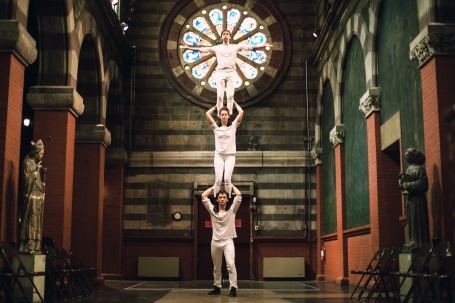
For students interested in pursuing a career in the arts, Ben advises going outside the Penn bubble, into Center City and into the suburbs to take in art all around Philadelphia: “Go see everything.” Getting outside of campus can reveal art forms that can truly inspire and broaden the horizons of what is possible. He also says: “Stay friends with people who you may not think share a worldview with you because I think those people can end up becoming your biggest advocates and supporters, and they will challenge you to make better work.” Ben shares that the arts are important to him because they allow for collaboration and true, deep communication with other people. Working artistically together can lead to intimate and profound relationships that are difficult to find in other contexts. “Artistic expression and creativity have a lot to do with what it means to be human and constantly pushing the boundaries of what we can say and what we can do and what’s possible and what we are able to achieve. Arts has always done that, and we need to keep innovating it and keep figuring out what needs to be said next and what needs to be heard.” Ben shares that his motivation to pursue the arts starts with a drive for the personal connections and individual feelings and moves into facing the large-scale societal issues in our world today. Ben views the arts as a great way to face them head-on.
Photo Credit 1: Lauren Johns
Photo Credit 2: Jenna Spitz
Ramita Ravi, C’17
Looking back on her time at Penn, Ramita says: “I don’t know that I would have been a professional dancer if I hadn’t gone to Penn, truly.” As Penn has no academic dance program, Ramita was hesitant when she matriculated. However, her experiences with the dance, performing arts, and Platt House communities provided her the opportunities to not only dance, but also choreograph, develop themes, incorporate videos, run a show, handle administrative duties, and manage a company. She learned the business side of dance, while building her artistic craft. As she grapples with booking dance space in NYC, completing contracts, and developing a company, Ramita credits learning 100% of those skills from her time at Penn. She also treasures the collaborative experiences she gained at the University, working with singing groups, videographers, photographers, and many other dance groups with different cultural backgrounds, goals, and missions. Ramita shares warm memories of the Emily Sachs Dance Benefit, an annual event bringing together every DAC group, strengthening that community and working together for a greater cause. She also remembers working with a group of dancers after her sophomore year to create a summer workshop series, which would become the Penn Summer Dance Series. This program grew to include hundreds of people during Ramita’s time at Penn and continues today. For Ramita, the fond memories live on: “I have so many’”my whole life was performing arts at Penn.”
 Ramita’s recent work has had her traveling to Boston, Hershey, Austin, DC, and even Philly! Looking forward, she is getting ready for lots of auditions, and she is incredibly excited about her upcoming plans for Project Convergence, including the collaboration with the American Tap Dance Foundation, the hub for tap dance companies across the country, as this is the first time the Foundation has brought in classical Indian Dance. Ramita shares that the arts are important to her because they are deeply intertwined with her identity: “I grew up in Pittsburgh in a small town, and I had access to American dance from a really young age where no one looked like me. And I also had access to Indian dance where everyone looked like me. Bridging those two worlds and feeling comfortable in both spaces was something I could only do through dance because I was neither all Indian or all American. I’m just both. That’s how it works. That’s what my identity is.” In her work moving forward, Ramita wants to create more spaces that allow people to express their stories and feel comfortable in their own shoes, their own voices, their own skin. For students who are interested in pursuing the arts beyond college, Ramita reminds them to own the multidimensional aspects of themselves: “The more you apply the multidimensional aspects of your personality and what you gained at Penn, the more successful I think you’ll be in this career. I would just say continue to be awesome and well-rounded and multidimensional, and it’ll take you really far.”
Ramita’s recent work has had her traveling to Boston, Hershey, Austin, DC, and even Philly! Looking forward, she is getting ready for lots of auditions, and she is incredibly excited about her upcoming plans for Project Convergence, including the collaboration with the American Tap Dance Foundation, the hub for tap dance companies across the country, as this is the first time the Foundation has brought in classical Indian Dance. Ramita shares that the arts are important to her because they are deeply intertwined with her identity: “I grew up in Pittsburgh in a small town, and I had access to American dance from a really young age where no one looked like me. And I also had access to Indian dance where everyone looked like me. Bridging those two worlds and feeling comfortable in both spaces was something I could only do through dance because I was neither all Indian or all American. I’m just both. That’s how it works. That’s what my identity is.” In her work moving forward, Ramita wants to create more spaces that allow people to express their stories and feel comfortable in their own shoes, their own voices, their own skin. For students who are interested in pursuing the arts beyond college, Ramita reminds them to own the multidimensional aspects of themselves: “The more you apply the multidimensional aspects of your personality and what you gained at Penn, the more successful I think you’ll be in this career. I would just say continue to be awesome and well-rounded and multidimensional, and it’ll take you really far.”
Photo Credit 1: Mike Esperanza
Photo Credit 2: Kevin Wang
Interview with InVersion Theatre
Tell us a little about yourselves, your hometowns, and your majors and graduation years.
- Johnny Lloyd: Asheville, NC; International Relations, 2011. I’m a playwright and producer based in Manhattan, NY. I am Producing Director for InVersion Theatre and currently an MFA Candidate in Playwriting at Columbia University studying under Lynn Nottage and David Henry Hwang.
- Rebecca LeVine: Longmont, CO; English, 2012. I live in Brooklyn and work in business development for an ebook startup. I also do some freelance graphic and web design work.
- Will Steinberger: Philadelphia, PA; English, 2011. I’m a theatre director, which means Johnny, Rebecca, and I have a baby together, called InVersion Theatre, that has produced seven full length plays since graduating from Penn, as well as numerous events, short plays, and assorted theatrical happenings. I also work often as an assistant director, dramaturg, and producer/arts administrator, mainly in New York, where I live.
What groups were you involved with during your time at Penn?
- ALL: INTUITONS!!!!
- JL: Counterparts and Mortar Board and a bunch of other TAC-e groups.
- RL: I dabbled in various activities, but TAC-e was my main thing, mostly acting, some directing, a bit of prop designing (prop designing is the best). I’m proud-slash-frightened to say I did at least one production every semester.
- WS: PennQuest, Friars.
How do you feel like the arts at Penn shaped or affected your career paths?
- JL: I really didn’t realize I could go into the arts until I was at Penn. Being able to create relationships with my fellow classmates opened up what theater meant for me and provided connections, friendships, and collaborators that have lasted through today.
- RL: Doing theater was too magical to ever give up completely.
- WS: I met Johnny and Rebecca, and I wouldn’t be making theatre the way I am today if it weren’t for the relationships I have with them. Penn also has a phenomenal DIY ethos, which encourages those scrappy enough to make theatre.
What are your favorite arts-related memories from your time at Penn?
- JL: I’m not allowed to say the parties, right?
- RL: Does that mean I’m not allowed to say the parties either? In all seriousness though, quite a few of my closest friends today are people I did shows with at Penn. Over the course of six or eight weeks of rehearsals, you spend all this time together, you have all these emotional experiences, you’re collaborating on this unique and beautiful thing. And you laugh endlessly, even (especially?) in rehearsal rooms for very, very dark shows.
- WS: Definitely the parties.
How did you start InVersion Theatre? What did that process look like?
- JL: The way I remember it, Will and I were living together and wanted to do a show together after graduating, and because iNtuitons had a relationship with Philly Fringe, we felt very comfortable doing a show in that festival. Rebecca came on soon after (as did another one of our college collaborators, Reni Ellis, who was our company manager for our first show). And after that, we kind of just kept on making plays together. It’s been easy because we’ve had a working relationship for ten years, but also because we would hang out even if we weren’t working together constantly.
- RL: I was a year behind Johnny and Will at Penn (a fact I remind them of often), so I was a senior when they were getting InVersion off the ground. In the spring of 2012, Will asked me if I had the time/interest to dramaturg their production of Miss Julie. Seeking any excuse to put off writing my thesis, I eagerly signed on. Following graduation, I realized just how little I wanted to give up doing theater with my friends, so at some point in there, I finagled my way into the role of Official InVersion Dramaturg. Seven years later, here we are!
- WS: It was a lot more like what we did together at Penn then unlike what we did together, which is a credit to how TAC-e and the University as a whole prepared us for art-making.
What is the key to your success as a team? Do you get on each other’s nerves at all?
- JL: When we’re at our best, we’re honest with each other about how we feel and what we want to do. You can’t not get on your collaborators’ nerves, but you can be honest about how you’re feeling and learn how to listen instead of trying to bury those feelings or taking feedback personally, and I think a lot of our success is because we’re constantly working to be honest and open in our communications.
- RL: Weird question. Will Steinberger, Johnny Lloyd, and Rebecca LeVine have never gotten on anyone’s nerves, ever.
- WS: Cry in public, not private. That’s our rule.
What is InVersion Theatre up to now and do you have individual upcoming projects you’re working on?
- ALL: We’re gearing up for round 3 of our We Read Books series in partnership with The Tank, in which we commission 6 playwrights to create 10-minute plays inspired by a classic text we’ve selected (Beowulf and Shirley Jackson’s “The Lottery” so far). We’re also at work on a new app-play about environmental catastrophe, set in Brooklyn’s Prospect Park. Oh, and we’re writing an original musical adaptation of Dracula, set in Silicon Valley, with music/lyrics by Andrew Underberg, who did not go to Penn.
- WS: I’m directing a play at Columbia right now and producing an off-Broadway play in the fall.
What is a piece of advice you would give to a student who is interested in pursuing the arts beyond their college career?
- JL: Penn is small. T
he world is big. Get ready for rejection, and learn how to welcome it. - RL: Creating and presenting art in the real world almost always requires money–for rehearsal and performance spaces, for costumes and sets and my beloved props, for marketing and publicity, for the labor of all the people working alongside you. At Penn, we were incredibly fortunate to have spaces and budgets that appeared as if by magic and the expertise of University employees whose salaries weren’t our responsibility. We got to imagine that money and art-making were unrelated–which, outside a supportive institution like Penn, is not remotely the case. You spend a lot of time fundraising. You have to ask a lot of your supporters. I’d advise someone seeking a career in the arts to be ready for that.
- WS: Remake the art market; don’t let it remake you. In other words, don’t lose the spark that got you jazzed about your work in the first place.
Why are the arts important to you?
- JL: When you’re in the arts, you don’t just get to show the human condition–you get to interpret it and take things that you think might just apply to you and find out that they actually apply to so many people. And opening up and finding common ground with others through such a vulnerable process is so inspiring and exciting.
- RL: We live in dark times. Making and experiencing and thinking about art gets us a little closer to the light.
- WS: Nothing matters more than meaningful personal encounters. Art sculpts the spaces and experiences in which these encounters happen.

